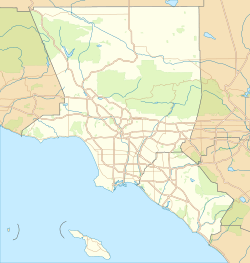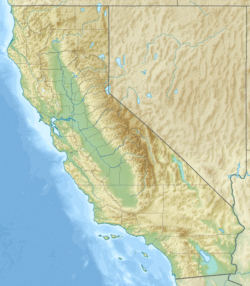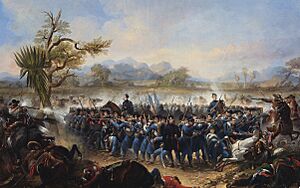Montebello, California facts for kids
Quick facts for kids
Montebello, California
|
||
|---|---|---|
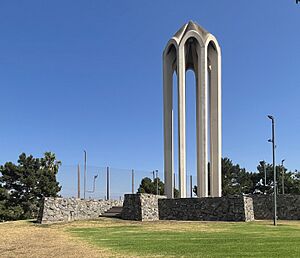 |
||
|
||
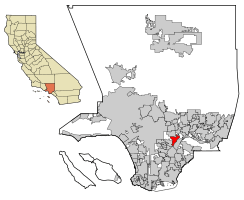
Location of Montebello in Los Angeles County, California
|
||
| Country | United States | |
| State | California | |
| County | Los Angeles | |
| Incorporated | October 16, 1920 | |
| Government | ||
| • Type | Council-Manager | |
| Area | ||
| • Total | 8.37 sq mi (21.68 km2) | |
| • Land | 8.33 sq mi (21.58 km2) | |
| • Water | 0.04 sq mi (0.10 km2) 0.48% | |
| Elevation | 203 ft (62 m) | |
| Population
(2020)
|
||
| • Total | 62,623 | |
| • Estimate
(July 2022)
|
60,569 | |
| • Density | 7,435.67/sq mi (2,870.93/km2) | |
| Time zone | UTC-8 (PST) | |
| • Summer (DST) | UTC-7 (PDT) | |
| ZIP Code |
90640
|
|
| Area code | 213 and 323 | |
| FIPS code | 06-48816 | |
| GNIS feature IDs | 1656573, 2411144 | |
Montebello means "Beautiful Mountain" in Italian. It is a city in Los Angeles County, California, United States. It is located just east of East Los Angeles. The city is about 8 miles east of downtown Los Angeles. Montebello is part of the Gateway Cities and San Gabriel Valley areas.
In the early 1900s, Montebello was known for its large oil reserves. In 2020, about 62,640 people lived there.
Contents
History of Montebello
Early Inhabitants and Missions
Long ago, the Tongva people lived along the Rio Hondo River. They were a group of Native Americans. The Tongva lived in much of the Los Angeles area. They also lived on islands like Santa Catalina.
When explorer Juan Rodríguez Cabrillo arrived in 1542, he met the Tongva. The Spanish called them "Gabrielino." Sadly, new diseases brought by settlers caused many Tongva people to die. By 1870, very few native people remained.
In 1771, two Franciscan missionaries started the first Mission San Gabriel Arcángel. It was called Mission Vieja. This mission was the start of Spanish settlement in the Los Angeles region. It was one of 21 missions built along California's El Camino Real.
Six years later, a big flood forced the mission to move. It moved north to its current spot in San Gabriel. The original mission site is now a California Historical Landmark.
Ranchos and Battles
During the mission years, Spanish colonists managed the land. They used a "Rancho" land grant system. Today's Montebello includes land from three old ranchos. These were Rancho San Antonio, Rancho La Merced, and Rancho Paso de Bartolo. The Juan Matias Sanchez Adobe, built in 1844, is the oldest building in Montebello.
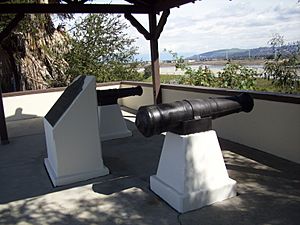
In 1847, the Battle of Río San Gabriel happened here. It was a very important victory for the U.S. Army. This battle helped the United States take control of Los Angeles. Today, the battle site is a California State Historical Landmark. Two cannons and a plaque mark the spot.
City Development and Growth
After the American Civil War, a large area of land was owned by Alessandro Repetto. After he died, his brother sold the land to five businessmen. They paid $60,000 for about 5,000 acres.
The city of Montebello started in 1899. It was built on 1,200 acres of land. An engineer named William Mulholland helped design the town's water system. In 1900, the water system became the Montebello Land and Water Company.
A townsite called Newmark was built near the railroad tracks. It was 200 acres. The rest of the land was divided into small farms. In 1920, the city leaders chose the name Montebello, replacing Newmark.
Montebello was first an agricultural community. It was famous for growing flowers, berries, fruits, and vegetables. The first flower show was held in 1912. The Montebello Women's Club sponsored it. The Montebello Chamber of Commerce helped pave streets and plant trees. They also helped create the city's first high school.
Montebello officially became a city on October 16, 1920. The city's official seal has a red poinsettia. This honors Montebello's farming past.
In the early 1900s, many Japanese-American farmers lived in south Montebello. During World War II, many were sent to camps far away. This happened because of a government order. Many could not return home.
In 1917, the Standard Oil Company found oil in the Montebello hills. This changed the city a lot. Oil fields replaced farms. The oil pumped from here produced a lot of California's crude oil. For 60 years, the Montebello hills were full of oil wells.
In March 2023, a strong tornado hit the city. It damaged 17 buildings and injured one person. It was the strongest tornado in the Los Angeles area since 1983.
Geography and Climate
Location of Montebello
Montebello is about 8 miles east of downtown Los Angeles. It is part of the Gateway Cities area. The northern part of the city is in the San Gabriel Valley. Nearby cities include Monterey Park and Commerce.
The city has a total area of about 8.4 square miles. Most of this is land. A small part, about 0.1 square miles, is water.
Montebello's Weather
Montebello has a warm climate. Summers are hot and dry. Winters are mild. The city gets most of its rain in the winter months.
| Climate data for Montebello, California | |||||||||||||
|---|---|---|---|---|---|---|---|---|---|---|---|---|---|
| Month | Jan | Feb | Mar | Apr | May | Jun | Jul | Aug | Sep | Oct | Nov | Dec | Year |
| Record high °F (°C) | 91 (33) |
95 (35) |
100 (38) |
104 (40) |
105 (41) |
108 (42) |
108 (42) |
106 (41) |
113 (45) |
106 (41) |
100 (38) |
88 (31) |
113 (45) |
| Mean daily maximum °F (°C) | 69.7 (20.9) |
71.3 (21.8) |
72.6 (22.6) |
77.4 (25.2) |
79.2 (26.2) |
84.2 (29.0) |
88.9 (31.6) |
89.4 (31.9) |
87.5 (30.8) |
82.2 (27.9) |
75.2 (24.0) |
70.7 (21.5) |
79.0 (26.1) |
| Mean daily minimum °F (°C) | 47.9 (8.8) |
48.7 (9.3) |
50.5 (10.3) |
53.1 (11.7) |
56.9 (13.8) |
60.9 (16.1) |
64.3 (17.9) |
65.4 (18.6) |
63.8 (17.7) |
58.4 (14.7) |
52.0 (11.1) |
47.3 (8.5) |
55.8 (13.2) |
| Record low °F (°C) | 30 (−1) |
29 (−2) |
30 (−1) |
32 (0) |
33 (1) |
38 (3) |
39 (4) |
44 (7) |
50 (10) |
44 (7) |
37 (3) |
30 (−1) |
29 (−2) |
| Average precipitation inches (mm) | 3.53 (90) |
3.60 (91) |
2.94 (75) |
0.90 (23) |
0.23 (5.8) |
0.06 (1.5) |
0.01 (0.25) |
0.02 (0.51) |
0.17 (4.3) |
0.31 (7.9) |
1.00 (25) |
1.67 (42) |
14.44 (367) |
| Source: http://www.wrcc.dri.edu/cgi-bin/cliMAIN.pl?ca5790 | |||||||||||||
People of Montebello
| Historical population | |||
|---|---|---|---|
| Census | Pop. | %± | |
| 1930 | 5,498 | — | |
| 1940 | 8,016 | 45.8% | |
| 1950 | 21,735 | 171.1% | |
| 1960 | 32,097 | 47.7% | |
| 1970 | 42,807 | 33.4% | |
| 1980 | 52,929 | 23.6% | |
| 1990 | 59,564 | 12.5% | |
| 2000 | 62,150 | 4.3% | |
| 2010 | 62,500 | 0.6% | |
| 2020 | 62,640 | 0.2% | |
| U.S. Decennial Census | |||
Population in 2020
The 2020 United States Census showed Montebello had 62,640 people. This means there were about 7,521 people per square mile. Many different groups of people live in Montebello. About 78% of the people were Hispanic or Latino.
Montebello had over 20,300 homes. Most of these homes were lived in. About 44% of homes were owned by the people living in them. The rest were rented. The average household income was about $72,317. About 13% of people lived in poverty.
Population in 2010
In 2010, Montebello had 62,500 people. The population density was about 7,464 people per square mile. About 79% of the people were Hispanic or Latino. Many residents are Mexican-American. Montebello also has a large Armenian-American community.
About 38% of people in Montebello were born in another country. Over 75% spoke a language other than English at home.
There were 19,012 households. About 43% of these homes had children under 18. The average household had 3.27 people. The average family had 3.67 people.
The median age in Montebello was 34.7 years. About 25% of the people were under 18. About 13% were 65 or older.
Economy and Jobs
Montebello has many businesses that provide jobs.
Major Employers
Here are some of the biggest employers in Montebello:
| # | Employer | # of Employees |
|---|---|---|
| 1 | Kaiser Permanente | 4,496 |
| 2 | Montebello Unified School District | 3,577 |
| 3 | Monarch Litho | 2,865 |
| 4 | The Shops at Montebello | 1,897 |
| 5 | Beverly Hospital | 860 |
| 6 | Bimbo Bakeries USA | 750 |
| 7 | Minson | 633 |
| 8 | City of Montebello | 601 |
| 9 | Royal Paper Box | 170 |
Parks and Fun Things to Do
Montebello has many parks for everyone to enjoy.
- Grant Rea Park: This park has the Montebello Barnyard Zoo. You can also find pony rides, train rides, and a small water park here.
- Bicknell Park: This park is home to the Montebello Genocide Memorial.
- Montebello City Park: This is the oldest park in the city. It used to have fishponds. Now it has a skateboard park.
- Sanchez Adobe Park: This park has the Juan Matias Sanchez Adobe. It was built in 1845 and is the oldest building in Montebello.
- Ashiya Park: This park is named after Montebello's sister city in Japan.
- Henry Acuna Park: This park is named after a Montebello Police officer who died on duty. There are memorials here.
- Reggie Rodriguez Park: This 11-acre park has the Reggie Rodriguez Community Center. Both are named after a Vietnam War hero.
- Chet Holifield Park: This park has the Chet Holifield Branch Library. Both are named after Congressman Chet Holifield.
Golf Course
The Montebello Municipal Golf Course is a large 120-acre course. It has 18 holes. It started as a private club in 1928. The city bought it in 1941. It also has hotels and a conference center.
Education in Montebello
Public Schools
The Montebello Unified School District serves the city. It also serves parts of other nearby cities. It is one of the largest school districts in Los Angeles County. Over 35,000 students from kindergarten to 12th grade attend. There are also 30,000 adults in adult education programs.
The district has:
- 18 elementary schools
- 6 intermediate schools
- 5 high schools
- 4 adult schools
The five high schools are:
- Montebello High School (founded in 1909)
- Bell Gardens High School
- Schurr High School
- Vail High School (an alternative high school)
- Applied Technology Center (ATC): This is a vocational high school. It opened in 2011. It offers modern technical training. Students must apply to attend ATC. The goal is to help students be ready for college and careers.
Private Schools
Montebello also has several private schools:
- Saint Benedict School: This is a private Catholic school for grades K-8. It opened in 1941.
- Our Lady of Miraculous Medal Parish School: This school opened in 1954.
- Cantwell-Sacred Heart of Mary High School: This is a private Catholic high school. It used to be two separate schools for boys and girls. They merged in 1991.
- St. John's Lutheran Church: This church has a school for grades K-8.
City Services
Getting Around Montebello
Montebello is easy to reach from several major freeways. These include the I-710, I-605, SR 60, and I-5.
Bus Services
The city has its own bus system called Montebello Bus Lines. It is the sixth largest public transit system in Los Angeles County. Over 8.2 million people ride the buses each year. It started in 1931 with four buses. Now it has 66 buses, including hybrid buses. It serves 14 communities.
Other Ways to Travel
- Montebello LINK: This is a shuttle service. It takes people to and from the Montebello/Commerce station.
- Montebello Dial-a-Taxi: This program helps senior citizens and people with disabilities get around. About 15,000 residents use this service.
Safety and Emergency Services
Police Department
Montebello has its own police department. It has 74 police officers. This includes the Chief of Police, two captains, and other leaders. The department also has 24 civilian staff. They offer services like Neighborhood Watch and a Citizen's Academy. They also provide free security checks for homes and businesses.
Fire Department
The Montebello Fire Department has three fire stations. They have three paramedic engine companies. They also have one truck company.
City Trees
The city takes care of about 20,000 city trees. Montebello has received a "Tree City U.S.A." award every year since 1991.
Famous People from Montebello
Many notable people have connections to Montebello:
- Alan Bannister: A Major League Baseball player.
- Richard Cabral: An actor known for American Crime.
- Ken Davitian: An actor, famous for his role in "Borat".
- John DeCuir: An Oscar-winning art director.
- Oscar De La Hoya: A 10-time boxing world champion and Olympic gold medalist.
- Rodney Eastman: An actor from the Nightmare on Elm Street movies.
- Deborah Foreman: An actress, star of Valley Girl.
- Darlene Hard: A tennis player who won many Grand Slam titles.
- Ed Hernandez: A California state senator.
- Bobby Knoop: A Major League Baseball player and coach.
- Mickey Klutts: A Major League Baseball player.
- Jack Larson: An actor, co-star in Adventures of Superman.
- Judi Evans Luciano: An actress from Days of Our Lives.
- Robert Bruce Merrifield: A Nobel Prize winner.
- Max Montoya: An NFL player.
- Sergio Mora: A professional boxer.
- Sona Movsesian: An author, podcast host, and Conan O'Brien's assistant.
- Mirai Nagasu: A professional figure skater and Olympian.
- Edward James Olmos: An actor and director.
- Ramona Pagel: An athlete who held the U.S. record in shot put.
- Joshua Pérez: A professional soccer player.
- Jeffrey Lee Pierce: A singer, songwriter, and musician.
- Jerry Pimm: A college basketball coach.
- Carl Renezeder: An off-road racing champion.
- Jack Russell: Lead singer for Great White.
- Mark Salas: A former MLB player.
- Hagop Sandaldjian: A microminiature sculptor.
- Catherine Sandoval: The first Latina Rhodes Scholar.
- Tom Tellez: A track star and coach.
- Nosaj Thing: A hip-hop recording artist.
- Art Torres: A politician.
- Michael Trevino: An actor, known for The Vampire Diaries.
- Eduardo Xol: A television personality.
Sister Cities
Montebello has special connections with two other cities around the world:
- Ashiya, Hyōgo, Japan: Montebello has been connected with Ashiya since 1961. Students are chosen to visit Ashiya every year.
- Stepanakert, Nagorno-Karabakh Republic: This connection started in 2005.
See also
 In Spanish: Montebello (California) para niños
In Spanish: Montebello (California) para niños
 | Leon Lynch |
 | Milton P. Webster |
 | Ferdinand Smith |



